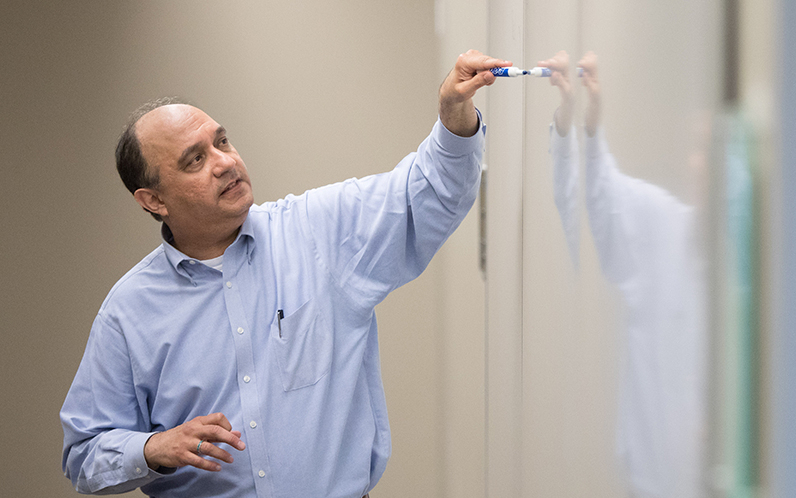
Rutgers Business School’s Newark campus where the EMBA program is based. Courtesy photo
Back before COVID sent most meetings to Zoom, Farrokh Langdana remembers interviewing a West Indies EMBA candidate in his office at Rutgers Business School.
Across from him, the candidate froze. He just couldn’t talk. But Langdana saw something in the older man, and his resume was fantastic. Langdana, who grew up in Mumbai, India, picked up a cricket ball from his table, given to him by his brother.
“West Indies? You play cricket right?” Langdana said to the quiet candidate and tossed him the ball.
“He just grabbed it, and then he wouldn’t stop talking,” Langdana tells Poets&Quants. “He went on to finish his PhD in finance and now he’s a professor.”
That’s the advantage of an academic-run EMBA program, as opposed to one run by staff, says Langdana, a professor of finance and economics but also the program director of Rutgers’ Executive MBA, nicknamed the EMBA Powerhouse. All applications come directly to him. He personally conducts about 200 EMBA interviews per year.
As a tenured professor, he has the power to look passed a bad day and a bad interview to see what a candidate might actually bring to an EMBA classroom.
AN EMBA RUN BY ACADEMICS
There are other advantages to having an EMBA managed by academics. For one, it is highly agile, able to respond quickly to student curriculum requests they hear about in classrooms or on lunch breaks. For another, Langdana isn’t as susceptible to PC pressure when it comes to finding the best professors. When he took the reigns of the program in 1997, in fact, he insisted that the Rutgers EMBA would be taught by the best professors, whether they came from Rutgers or not. His lecturers are the best of the best from business schools and industry, he says.
Take Rosa Oppenheim who has taught at Rutgers for 50 years. The professor and vice chair of supply chain management founded Rutgers’ EMBA in 1980, and she just taught her last class in December. She was selected one of Poets&Quants’ Best Undergraduate Professors of 2022.
“When she was dean, she gave me this job. She has taught every single executive MBA since the creation of the program, and hers are just very big shoes to fill,” Langdana says. “I miss her already. An absolutely towering, towering person, and it speaks to the expertise of our faculty.”
The Rutgers EMBA is one of the oldest in the country, launching a year after Columbia Business School’s and a year before the EMBA at NYU Stern School of Business – schools that remain two of Rutgers’ top competitors in the crowded Tri-State market.
The program tied for 24th place in Poets&Quants’ latest EMBA ranking, a composite list based on U.S. schools’ performance in the three major EMBA rankings – U.S. News & World Report, the Financial Times, and The Economist. Schools that don’t participate in all three are penalized by our methodology. (Rutgers didn’t participate in the U.S. News ranking considered in our methodology.)
The Financial Times ranked Rutgers the 15th top EMBA business school in the U.S., second for international course experience, seventh for career progress, and eighth for salary increase.
This week, we’re looking at Rutgers’ EMBA Powerhouse as part of our EMBA Spotlight series in which we try to highlight the larger trends in the degree while pinpointing what makes each program unique. Below, we speak with Langdana, program director as well as a professor who teaches two courses in the program: macroeconomics and international trade. Our conversation has been edited for length and clarity.
What are the advantages of an academic run EMBA program as opposed to one run by staff?
That’s a huge question. The thing is in our program, the professors, myself included, are embedded with the students every class day – so breakfast, lunch, two coffee breaks – and the feedback is continuous. We are talking to them all the time. If they say they need digital marketing, or forensic accounting, or they are using big data and artificial intelligence, there is a very short feedback time to when we can respond. In other words, if we are agile, and apparently we are, we can respond very quickly as professors as opposed to a staff person passing along the feedback.

Farrokh Langdana, Rutgers EMBA director and professor
The other thing is, if you're a tenured professor like I am, there is stuff you can do as director compared to a non-tenured staff member who has to be very careful politically. For example, take the subject of cost accounting. I could have a professor who is a superstar, who is tenured and who is more senior than me. But I have to pull his course from the executive MBA because students need more forensic accounting and statement analysis. The cost accounting he’d been teaching is great, but it was more for a production era economy. Doing that is not easy. It's a big deal to teach an executive MBA program, and when you are pulled for no reason other than the world has changed, people take it badly.
As an academic-run program, our curriculum is so nimble that we change almost every semester. And this is how the rankings have come. We’re in the top three in the world in economics for four years in a row.
When you say ‘it's like a big deal to teach the executive program,’ what do you like about teaching EMBAs?
First of all, we ask for 10 years of experience in our program. There are now executive MBA programs that ask for three years experience. So there’s executive and then there's executive. So, we have heavy lifting executives in our program.
This year we have four doctors in the class. A couple of years ago, I had four colonels. We’ve had several lawyers, curators of museums, directors of ballets. It's just a huge range of people, but they're all very accomplished in their fields. We had a doctor from Sloan Kettering who did the first COVID saliva test, and he was featured in the New York Times a couple of times. And on and on and on.
There's so much experience in the classroom that it's actually a joy. When I'm programming macroeconomics, typically there'll be a person in the class, maybe a tax accountant, who will know more tax policy than I will ever know or even want to know. Now, when I talk about Trump's tax cuts and Biden’s tax increase, there'll be somebody who will say, “Farrokh, Farrokh, Farrokh, here’s what's really happening.” I love that.
I want to make sure that Rutgers professors who teach in the EMBA program are comfortable with delegating the discussion to somebody in class. We have so much embedded experience that it elevates the whole learning process. I find that great and fascinating.
These students are also together every weekend. The first week of every semester, they stay in a hotel together. Then they go to China – or Vietnam now – for two weeks. They move as a cohort, and it becomes a very close knit family here. You go into a Saturday morning class, and there's a lot of laughing. There's a lot of hard work too, but there's a lot of kidding around. It's a very comfortable atmosphere.
Describe the ways in which the Rutgers EMBA is agile.
A couple of years ago at an open house, someone said, “Oh, you’ve been adopting an agile strategy from supply chain management!” I said, “Look, we've been doing this strategy since 1997, before agile was cool.” My team was bursting out laughing because we didn't say, “We’re doing an agile strategy,” we just knew we had to compete with NYU, Columbia, Cornell. We realized that if we just met them head on and just reach their level, we would lose. We have to outperform, we have to hit harder.
That has been our mantra with creating an agile curriculum taught by superstar professors. That's how we are ahead of them in so many areas like finance, strategy and economics.
Have you experimented with different delivery formats such as hybrid or online?
Yes. We have two courses that will remain hybrid even after COVID.
The only thing I negotiated from the dean when I got this position many, many years ago was that I'd have autonomy. In this flagship program, I get to choose the best professor. If we have them at Rutgers, great. If not, I get them from somewhere else. So, for example, my pricing strategy professor is actually a former student of mine, by the way of the Executive MBA Class of 2020. He’s in Madrid, and he teaches it via Zoom. Similarly, my supply chain professor is from Singapore. So those two courses in the second semester will be online.
Are there flexible delivery options for students who perhaps can’t travel to campus some week due to work or family commitments?
Yes, absolutely. Ivy Exec consistently ranks Rutgers No. 1 in work life balance for executive MBAs. Finance rankings or strategy rankings, those are return on investment measures. Those we understand. But we thought, what the heck was work life balance? Turns out that is super important for our applicants.
We actually bend over backwards for our students. I have a doctor right now who commutes to the program from Virginia Beach, and she couldn't make it to the final. Another person who was in Portugal on business for the final. So I emailed them the exam, and I just said, “Sign the pledge, take two hours, and send it back to me.” Because at this point in their careers, they aren’t going to cheat.
We offer open houses, refresher courses, and so on, online to our EMBA students. They all want those to be offered online, but they want the classes to be in-person. Our part-time MBA students are very interested in remote options, but the executive MBAs are really into networking, learning from each other, and bonding.
In the past, the executive MBA was really just an extension of the other MBA programs. What I'm seeing, at least at Rutgers, the Executive MBA is pulling away. It's becoming a separate kettle of fish altogether. Students want personal contact.

Farrokh Langdana is EMBA director at Rutgers Business School. A tenured professor, he also teaches two course in the program, macroeconomics and international trade. Courtesy photo
You have mentioned a couple of differentiators of the Rutgers EMBA, but are there any others that we should talk about?
In terms of the curriculum, all of the artificial intelligence, machine learning, and big data content is built into our Strategy course. It is not taught separately like some other EMBA programs. So you tackle a strategy case using the tools of these topics – as it should be. That is very hard to do, especially in a room where there are people in class who are doing digital transformation for their companies. That was a great upgrade.
Then, speaking of digital transformation, we have a professor from the University of California, San Diego, who worked with Microsoft and Amazon in this very area. It covers how to digitally transform your company in pharma, healthcare, and consumer goods, and so forth. There's a whole course in digital marketing that was pushed up many notches, and made even more sophisticated.
How many people in a typical cohort?
We typically have 46 to 50, but we went down to 28 last year. This year, it looks like the numbers are back up – open houses are up, interviews are up. I think COVID finally caught up to us last year.
What kind of student does Rutgers target?
It’s not like we’re looking for people in finance, or pharma, or healthcare, or any particular industry. I'm looking for people who are really, really hungry to use the knowledge we give them and apply that at work. People who are actually just here to learn and eager for information. Anyone with a hint of attitude, I don't want. That's why it's such a close program. People stay in touch for years and years, and when we have an alumni event, we have 300-400 people on Zoom.
What are some notable program milestones?
Rutgers Business School was the first major school in China after Tiananmen Square. We sort of grew up with China as it was welcoming in the rest of the world. We had MBA programs in Beijing and Shanghai, with ambassadors from companies like Motorola, Boeing, Airbus. I took the New Jersey EMBA class to China for our summer trip maybe 20 times. Now that story's over, with COVID and everything happening there now. So next year, we are going to Vietnam. So that's going to be a huge change.
What are some of the opportunities and challenges you see ahead for the Rutgers EMBA?
Prior to COVID, adding value was our big thing. We were usually two-thirds the cost of our competition. We've really looked at return on investment, how much students’ salaries went up, how much they could use next week at work. Now we are about half the cost of our competition. So we've been very careful not to just jack up the price.
Now we have to constantly make ourselves even more relevant, because what we are facing is if there's not a discerning applicant, one degree looks like another. I mean, you have Boston University, Penn State and Wharton offering online MBAs. If it's just a degree that students are looking at for work, what’s wrong with those?
So we have to stress the advantages of an in-person program, how much they learn from each other, and all the networking. Almost 90% of all the job switching that happens in EMBA happens due to the connections with classmates.
The EMBA field is even more crowded, and the online programs erode away any locational advantage we had. If we are the big program in New Jersey, well, that doesn't mean as much anymore because now you can be in a program from Singapore or Iceland.
Anything else you’d like to add?
The Rutgers EMBA is known as the powerhouse. “Welcome to the Powerhouse,” is our slogan, and our job is to keep it a powerhouse. We do that by giving students value.
We don't pull any punches. It's an intense program – families love us when it’s over – but we give them real value and we look after them even after they graduate. They can meet with our executive coaches free of charge and discuss things like promotions and negotiating a new salary. Our students are never really gone, they have us for life.
DON’T MISS THESE STORIES IN OUR EMBA SPOTLIGHT SERIES:
- UW FOSTER’S PROGRAM BRINGS STUDENTS TO SEATTLE’S TECH MECCA
- EMORY GOIZUETA’S PURSUIT OF FLEXIBILITY
- TCU NEELEY’S PROMISE: ‘ROI STARTS MONDAY’
- AT UMN CARLSON, A NEW CURRICULUM & HYBRID OPTION
- HOW CORNELL JOHNSON’S PROGRAM IS UNIQUELY SUITED TO THE MOMENT





Questions about this article? Email us or leave a comment below.